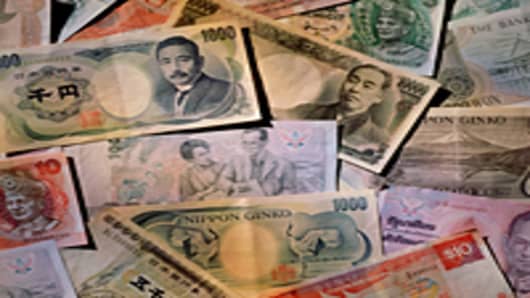South Korea warned on Wednesday it might consider a tax on financial transactions and Thailand said it was worried its strong currency would hurt exporters as moves by advanced economies to flood markets with easy money increasingly spill over into other countries.
Government officials in two of the four Asian tiger economies, which fell victim to massive outflows of speculative money in the late 1990s, expressed concerns over the negative impacts of super-loose monetary policy just two weeks before a Group of 20 finance chiefs' meeting in Moscow.
Policymakers in advanced countries, particularly Japan and the United States, have been acting aggressively to print more money and reflate their economies since the global financial crisis.
(Read More: G20 Unlikely to Pressure Japan Over Weakening Yen)
This has had the effect of weakening their currencies while strengthening those of many other countries from South Korea to Mexico, making their exports less competitive, roiling their financial markets and threatening to feed destabilizing asset bubbles.
"The external environment and foreign exchange market movements since the fourth quarter of 2012 have created a considerably worrying situation," South Korean Deputy Finance Minister Choi Jong-ku told a seminar in Seoul.
"The recent wave of quantitative easing policies has created an unprecedented situation and makes it necessary (for affected countries) to adopt a paradigm shift in response," Choi said.
The South Korean government will tell state-controlled firms to refrain from borrowing abroad and will further tighten rules on banks' currency derivatives trading to ease volatility in foreign exchange markets, Choi said.
(Read More: Currency Wars Can't Be Won: Bank of Korea Chief)
Seoul was opposed to imposing an outright levy on financial transactions such as the Tobin tax being debated in Europe, but would consider similar measures should speculation in the won currency intensify over time, he added.
Such a tax could discourage speculation but might also reduce normal investment, possibly even causing foreign investors to flee a market en masse.
In Bangkok, Finance Minister Kittirat Na Ranong told reporters that Prime Minister Yingluck Shinawatra was worried about the fallout from advanced economies' easy money policies and has ordered policymakers to discuss ways to deal with it.
He said authorities will use normal financial measures to manage flows of money into and out of the country but added there were no plans to use capital controls or taxes.
The Thai baht is hovering near a 17-month high and has risen close to 3 percent against the U.S. dollar so far this year.
Talk about a currency war, or competitive devaluation of currencies aimed at giving exporters an upper hand in pricing goods abroad, dominated discussions at the World Economic Forum in Davos last week, with many central bankers and business executives questioning the wisdom of such money policy.
German Chancellor Angela Merkel last week singled out Japan as a source of concern following recent moves by its central bank to quicken the pace of money-printing.
Currency War?
Authorities in Thailand, South Korea, Taiwan and the Philippines have repeatedly intervened in foreign exchange markets in recent months to try to slow the advance of their currencies, which they fear could jeopardize their expected economic recoveries.
Latin American policymakers have also been bolstering their defenses.
Colombia cut interest rates this month and said it would ramp up dollar purchases, Peru plans to pre-pay up to $1.5 billion in foreign debt this year and is intervening aggressively to curb currency gains, and Mexico is considering an interest rate cut that some economists believe reflects as much a desire for a weaker peso as it does concerns about growth.
(Read More: Currency War? Not Just Yet, Expert Says)
"I sincerely hope other countries do not get into competitive depreciation of their currencies," Indian Finance Minister Palaniapan Chidambaram told Reuters Television in London on Tuesday.
Chidambaram said it was too early to say Japan's latest round of policy easing earlier this month constituted a currency war but expressed strong concerns about such a scenario.
"It will hurt us very badly. Our exports are down this year compared to last year because of the global situation...If (there is currency war), our exports will suffer even more."
Japanese Prime Minister Shinzo Abe, whose campaign for unlimited money printing has sent the yen plunging, waded into the growing global debate about currency wars for the first time on Wednesday, shrugging off such criticism.
(Read More: Remember the Yen Carry Trade? Well, It's Back)
The yen fell 10 percent against the dollar in the final quarter of 2012 alone, its sharpest quarterly loss in 17 years, on expectations the BOJ and a new government would launch additional stimulus.
This dealt an especially heavy blow to export-dependent economies in the region such as South Korea and Thailand as their currencies were firming against the dollar.
As a result, the value of the South Korean won and Thai baht against the yen surged 16.5 percent and 12.1 percent, respectively, in the fourth quarter, marking their biggest quarterly gains in nearly 15 years, Thomson Reuters data shows.
"I don't think Japan or any specific country will be singled out (at the G20 finance chiefs' meeting), but obviously this is among the top issues taking place in the financial markets and therefore will likely be discussed," a G20 negotiator from an Asian country told Reuters recently.
(Read More: Japan Denies Currency Manipulation Claims Ahead of G20)
G20 leaders agreed at a summit in Seoul in 2010 to avoid waging competitive currency devaluation and instead to make efforts to ease the current account imbalances identified as one of the causes behind the global financial instability.


